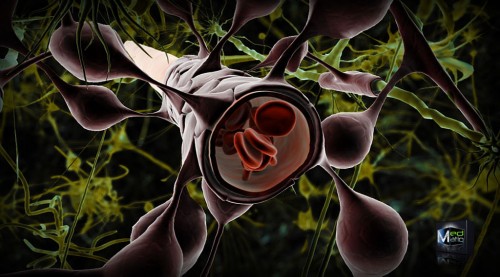A chip based on stem cells taken from patients with neurological diseases accurately demonstrated the function of the blood-brain barrier

Researchers from Ben-Gurion University of the Negev have created a living copy of the blood-brain barrier, which functions as it does in the person who donated the stem cells for its production. This innovative technology paves new ways to decipher brain disorders and will make it possible to predict the effectiveness of neurological drugs in a personalized way. The research findings were published in a special issue of the scientific journal Cell Stem Cell, released on the occasion of the World Association for Brain Cell Research conference.
The Blood-Brain Barrier (BBB) functions as the gatekeeper of the central nervous system and protects the delicate brain tissues from the passage of toxins and foreign substances in the bloodstream. The proper functioning of the barrier is essential for the proper functioning of the brain and damage to it is linked to a variety of neurological diseases including Alzheimer's and multiple sclerosis. But alongside its critical activity in protecting the brain, most of the drugs available today are unable to penetrate it, a challenge that makes it difficult to develop neurological drugs for neurodegenerative diseases such as ALS, Parkinson's and Huntington's disease, which affect millions of people. Also, a fundamental difference in the functioning of the blood-brain barrier between humans and model animals poses an additional difficulty to research today, and requires the development of new human models that simulate the activity of the barrier.
The leader of the research group, Dr. Gad Vatin from the Department of Physiology and Cell Biology and the Center for Regenerative Medicine and Stem Cell Research at Ben-Gurion University, together with researchers from Cedars-Sinai Hospital in Los Angeles, genetically engineered stem cells induced from people's blood samples. From these cells the researchers grew nerve cells, blood vessel cells of the brain and supporting cells that actually make up the blood brain barrier. All of these were seeded on a tiny chip made of transparent silicon (Organ-on-Chip) in a way that simulates the physiological environment of the blood vessels in the human brain. The researchers allowed the cells to create interactions between the different cell types and injected human blood into the system. The cells soon formed a functional unit that behaves much like the blood-brain barrier in the human body, including blocking the passage of certain drugs.
The researchers demonstrated how a chip created from nerve cells of people with the rare Allen Herndon Dudley syndrome functions in exactly the same way as the blood brain barrier in patients with this disease. Thus, the model showed that the cause of the disease is a genetic mutation that does not allow the passage of thyroid hormone through the barrier. In another model of Huntington's disease, the researchers showed that the barrier does not form properly, allowing the passage of molecules that should not reach the brain when the barrier is functioning properly.
The research leaders note that this is the first time that stem cells of different specifications have been used to create a physiological structure of the blood-brain barrier in the customized model.
"The resulting chip (BBB-Chip) simulates the activity of the barrier very well, and allows us to measure the passage of drugs from the bloodstream to the central nervous system," explains Dr. Vetin. "By preparing personal chips, we demonstrated that there is a difference between the blood-brain barrier function of patients with neurological diseases and healthy people. This technology paves the way for more precise medicine, where it will be possible to predict the effectiveness of neurological drugs for each person in a personalized way."
for the scientific article
More of the topic in Hayadan:
- "A brain system on a chip revealed to us new details about the activity of the blood-brain barrier, which will help in the treatment of Alzheimer's and the effects of drugs"
- The use of MRI-guided US enabled the breakthrough of the blood-brain barrier in Alzheimer's patients
- Open the blood-brain barrier

3 תגובות
There is a food supplement on the market developed by Prof. Ruth Gavizon and others, called Grangard, which claims to transform pomegranate seed oil drops into micro-droplets that will cross the blood-brain barrier by incorporating nanotechnology. Is it possible? Thank you very much for an answer.
Angels holding your hands
Stunning